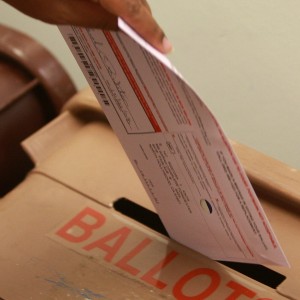But where the governor simply says current workers will ultimately have to split the annual contributions to their pensions with government -- and make no mistake, that's not a small issue -- the GOP 'pension tough' initiative would force workers, for the foreseeable future, to pick up the majority of the cost of their pensions.
Here's how it's put in a summary distributed to reporters:
Government employers and their employees will equally share the cost of retirement benefits, except while their pension funds are less than 80% funded using federal standards for private sector pension funds, when employees could be required to pay more for their same benefits and for a share of unfunded liabilities.
Note the section about the funding status of the pension funds -- that's the hammer.
Not only are both CalPERS and CalSTRS currently projected to be less than 80% fully funded for future retiree payments (thus creating the so-called "unfunded liability"), but the initiative says the funds will have to be measured by "private sector" accounting standards -- and those are significantly more conservative than the projections used by public sector pension funds.
That's not all. The initiative further says that until California'a pension systems are funded at a level above 80%, state and local government payments are capped at a smaller percentage (6%-9%) of a worker's salary. "Government employees," says the handout, "would have to pick up the remainder of normal cost until their pension fund exceeds 80% funding."
In other words, government pension payments would go down... worker pension payments would go up... and given how poorly the state's pension funds score on the private sector measurement, that system would be in place for a very long time.
The initiative would allow unhappy current public employees the chance to switch their future retirement packages to the 401(k) hybrid plan -- which would also shrink government costs.
Now for the 'pension tougher' initiative being filed yesterday by the GOP quartet. It offers virtually the same system to existing state and local workers, but its approach for future workers is more intense. The initiative would ban pension funds from having unfunded liabilities... and thus says that a fully "defined contribution" pension (that's a 401(k) style plan) would likely be the only option for state and local workers hired after its presumed passage by the voters.
Yes, this is all presumed. Some would even say speculative... or highly speculative. The fact that the group (technically known as California Pension Reform) is filing two separate initiatives shows that they've not settled on which, if either, is more politically viable. It also shows that part of yesterday's announcement is to get some news media attention and, perhaps, shake loose some coinage from the kind of big donors needed to actually qualify an initiative for the November 2012 ballot.
It also presents a very interesting set of questions about the politics of pension reform over the next 12 months.
Saying that public employee labor unions disliked Brown's pension proposal last week is like saying my Duke Blue Devils dislike the University of North Carolina Tar Heels. They consider it, it seems, a proposal from which to negotiate down to something they think is more fair to their employees.
But placed beside the two initiatives unveiled yesterday, Brown's plan looks downright tame when it comes to current workers -- and that makes organized labor's next chess move hugely important. Already, labor faces the perception that they need to embrace Brown when it comes to pension reform, that as unhappy as they might be with the Guv's initial proposal, he's still largely on their side.
The initial attack from the leading labor group on pension issues is on the authors of these initiatives. "Pot, meet kettle," tweeted Democratic strategist Steve Maviglio. "Schwarzenegger GOPer's Pellissier & Genest, getting $100k+ pensions & airtime, to unveil #capension initiative. #hypocrisy"
That line of attack will also likely include jabs at co-author Marcia Fritz, a leading conservative critic of public employee pensions whose own organization has stirred debate over disclosure of some of financial backers.
The initiatives unveiled yesterday may be the big November 2012 conservative shot at pension reform everyone's been assuming would happen. If so, the debate can now begin in earnest.
Update: In a conference call with reporters yesterday, backers of the initiatives said they'll make a decision in January about which proposal to push for November 2012, a decision based on polling and the title and summary issued to these measures. They estimate they'll need $3 million to qualify an initiative, and admit that they've not yet lined up enough donors to make that happen.
They also said that the increased pension payments for current workers would be phased in at no more than a 3% increase per year -- thus, they argue there would be no sticker shock for a worker who has to ultimately start contributing a lot more out of their paychecks. The group also said it feels confident that system (higher contributions for current workers, a cap on government contributions) can withstand legal challenge... though that's undoubtedly a huge issue, given how some analysts have interpreted the laws regarding promises made to workers already on the job.
Also yesterday, the leader of a prominent union-led pension committee invoked the Wisconsin union saga in his emailed response to the initiatives. Dave Low said each is "a sloppy proposal, containing provisions that have already been determined illegal by the Supreme Court. We will continue to work with the Governor and Legislature to craft changes in the state's complex pension system rather than have extremist politically-motivated ballot box measures..."
